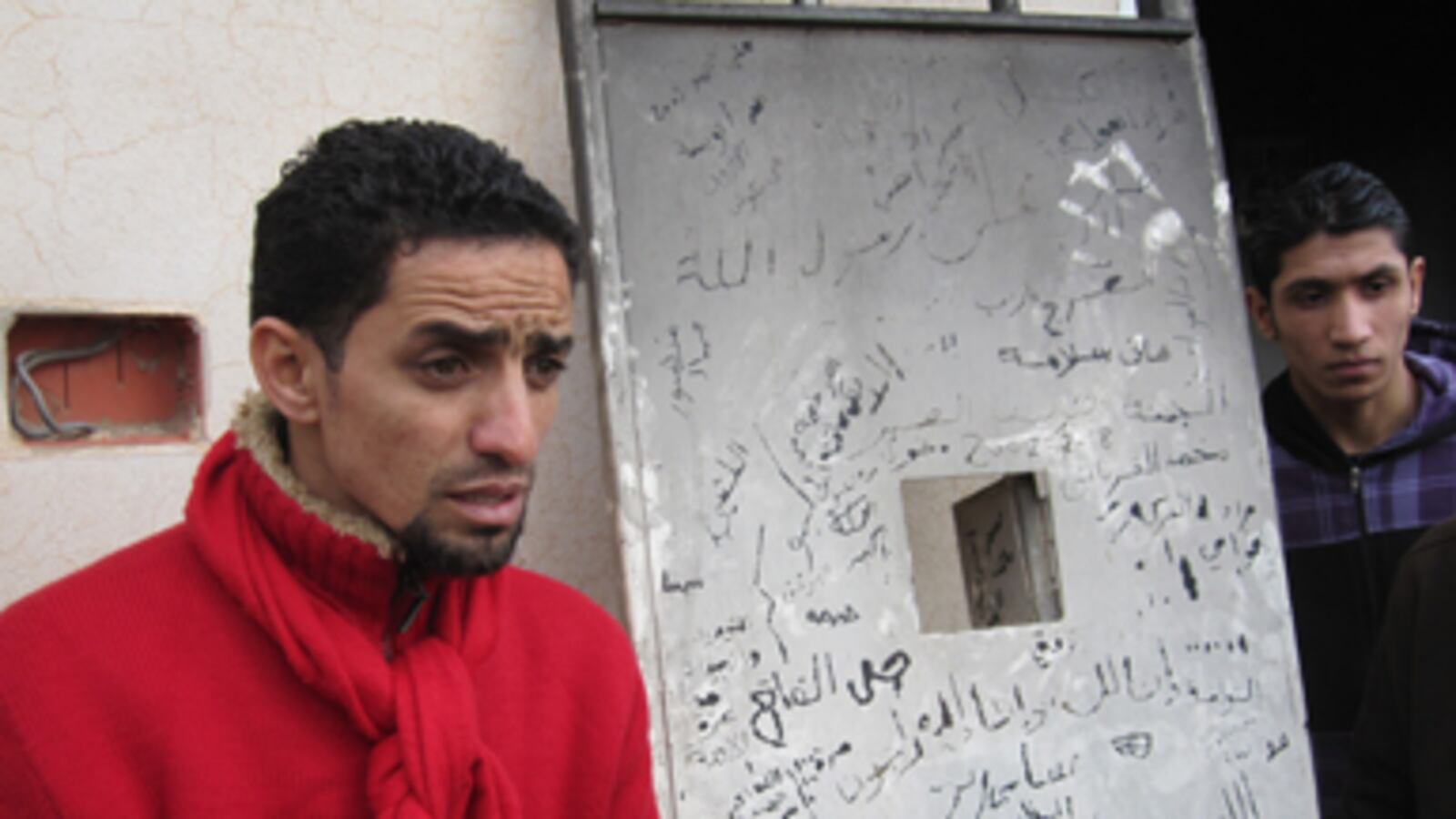Free from Gaddafi's grip, the eastern city of Benghazi is revealing the brutal methods the ruler uses to quash dissent. Babak Dehghanpisheh reports from a torture clearing house. Plus, shocking photos and videos from Libya's streets.
Abdul Salam Barghati locks his wrists and ankles around an iron bar with his body dangling just a few inches off the ground. "This was called the ‘Hyundai,'" he says, describing a torture position that Libyan interior ministry forces used at a notorious prison in Benghazi. "They beat us with sticks while we were hanging for hours."

Barghati, 35, and dozens of other former prisoners wandered through the facility, or what's left of it, today, reliving dark memories of their time here and musing over just how much has changed in a little over a week. The facility, known as the Internal Security Directorate, was used as a clearing house for political prisoners or anyone else deemed a threat to the regime of Muammar Gaddafi, the country's loony, paranoid dictator, in eastern Libya. Many of the detainees were then sent on to Tripoli. No one talked about these kinds of places in Gaddafi's security state, though international human rights groups have long catalogued the regime's abuses. Now, with large swathes of eastern Libya, including Benghazi, out of the dictator's control, ordinary citizens are openly discussing the regime's brutality and getting a glimpse of its torture chambers at this facility, and many similar ones, for the first time in more than four decades.
The Internal Security Directorate was attacked and torched by anti-Gaddafi protestors on February 18th, only one day after large-scale protests kicked off in Benghazi. It's clear how much the place was loathed: Every car and building in the compound has been torched, and file cabinets along with video and audio recording equipment are strewn, in burned pieces, across the parking lot. Barghati, a muscular young man sporting a bright red jacket and grey pants, wandered the wreckage today with his twin brother Suleiman and Badr Abdul Karami, 30, a stout fellow prisoner nicknamed "Taxi" because of his knack for passing on messages inside the wire. The air was thick with the smell of burned plastic and the tiny cells, only three feet by five feet, were covered with ash, shattered glass and charred, splintered wood. Graffiti inside the cells gave a hint of the desperation that prisoners felt trapped in the cells. "My eyes are melting like wax from a candle," one prisoner wrote. "Oh prison, I hope an earthquake destroys you," wrote another. Barghati, who works as a small businessman now, found his cell door and was choked up with emotion. He pointed to the name of his neighborhood that he carved in the door along with his own nickname, "The Twin." "This place was like hell for us," he says, taking a deep breath.
"Allah brought us comfort then and Allah is with us now," Barghati says, raising his voice. "This country will be free."
Barghati and Karami were brought in together on suspicion of being members of an Islamic radical organization—a charge they both deny—in April, 2006, and kept at the facility for six months. At various times two to three other people were crammed into their tiny cells. They were kept apart, but sometimes Barghati would lay flat and whisper a Koranic verse under the door of his cell. Karami would often hear him and finish the verse, a way of showing his support, particularly after a round of torture at the hands of the guards. Karami goes through a rote list of the abuse he received at the hands of the guards at the facility: electric shocks, beatings and sleep deprivation. He also shows a position where guards stripped him naked and cuffed his wrists to the top of the prison door while pounding his kidneys with a billy club. "They treated us worse than animals," Karami says with a contemptuous snort.
As the two are talking, a handful of other former prisoners gather around and compare notes, some rolling up sleeves or pant legs to show scars and lumps from the torture they endured. There is a round of morbid laughter when many of them realize they were routinely given the "Hyundai" treatment. Barghati then flashes the other prisoners a quick smile to show off two rows of false teeth, a permanent reminder of his time at the facility. During one interrogation session, Barghati's hands were cuffed from behind and he was blindfolded. A guard then grabbed the back of the blindfold and rammed his mouth into the edge of a table, knocking out all his front teeth. The guards called that move the "Ray-Ban," for the brand of sunglasses. "Allah brought us comfort then and Allah is with us now," Barghati says, raising his voice. "This country will be free."
• Babak Dehghanpisheh: Libya’s Liberated CityWhile this detention center has drawn many former prisoners, the must-see stop for most residents of Benghazi is the Katiba, a sprawling military base and detention facility which includes one of Gaddafi's residences. The base was the site of a fierce battle between regime security forces and anti-government protestors last week and there are pockmarks of heavy caliber weapons on nearby walls as well as upturned trees and bushes along the periphery. The three-day battle to take over the base left at least 100 protestors dead. At one main gate, a young man stood on top of a burned out Kia holding a picture of Mahdi Mohammed Ziu, a family man who made a huge sacrifice. On the afternoon of February 20th, Ziu rammed his Kia which was rigged with cooking gas canisters, fuel containers and other homemade explosives, into the gate, blasting a way open for protestors to get inside. Ziu died in the explosion.
Every building within the compound has been torched now, and families crunch through the broken glass inside the buildings taking pictures and videos with their cameras and cell phones. One group of young men ran through Gaddafi's former house chanting slogans comparing the despot to a shoe and waving the green, red, and black flag of the opposition. "We want to tell the world we were living under a dictatorship," says Yunus Ahmed, a 51-year old professor at the University of Ghar Younis who was walking through the burnt-out complex today. "And our youth will keep fighting this dictatorship."
Babak Dehghanpisheh was named Newsweek’s Baghdad Bureau Chief in December 2006. He has been covering Iraq regularly for the past five years.






